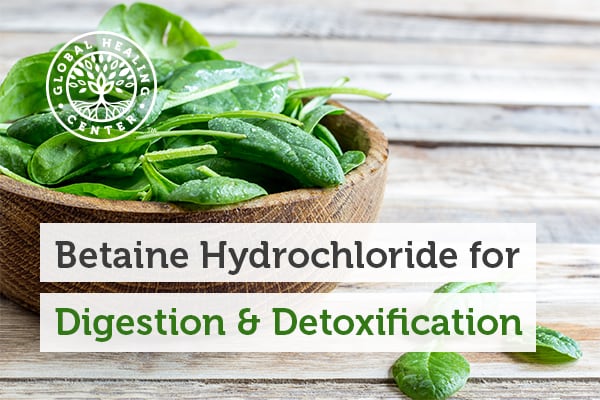
Betaine hydrochloride is an organic compound and vitamin-like substance found in many different foods such as sugar beets, grains, and spinach. It is recommended by naturopaths and medical doctors as a supplemental source of hydrochloric acid in the stomach. Studies[1] show that this compound can profoundly benefit individuals suffering from digestive upsets or a deficiency of stomach acid production.
Normally, a healthy stomach can produce enough gastric acid to kill harmful organisms. But, when people experience deficiencies in producing stomach acid, they are more likely to have bacterial and intestinal infections and the increased presence of harmful organisms.[2] Betaine HCl helps the stomach break down fat and protein in the food. It also assists the body's detoxification processes. It helps the body digest food and assimilate nutrients like protein, vitamin B12, calcium, and iron.
The Action of Betaine Hydrochloride
The chemical betaine is absorbed in the digestive tract into what are known as enterocytes. Enterocytes circulate through the liver, where the betaine is extracted and metabolized. From there, betaine hydrochloride is converted into betaine inside the alkaline environment of the small intestine, helping to create a favorable environment for digestion.
The Health Benefits of Betaine HCl

Betaine hydrochloride is a powerful digestive aid. It's especially helpful for people who may have been privy to a poor diet, prolonged dehydration, and generalized stress. It has been shown to offer digestive support to perimenopausal women and elderly individuals. Betaine HCl is beneficial for addressing hypochlorhydria, a deficiency of stomach acid production. It is also a crucial compound in balancing homocysteine levels, a condition related to poor cardiovascular health. As we age, the body naturally produces fewer digestive enzymes. Due to reduced enzymatic activity, Betaine HCl levels decrease. Depending on the individual, this can lead to sluggish digestion and poor nutrient absorption. It also means that the body is not detoxifying itself as well as it should. Things that the body would normally expel remain lodged in the system. This leads to toxic overload and systemic tissue irritation. Many people facing poor digestion have found that taking plant-derived betaine HCl before a meal supports digestion.
Other Conditions Betaine HCl May Help
- Acne
- Skin disorders
- Diarrhea
- Gallstones
- Stomach ulcer
- Chronic hives
- Food sensitivities
- Thyroid function
- Inner ear infections
- Iron-deficiency anemia
- Candida & yeast infections
- Stomach or esophageal disorders
- General malabsorption of nutrients
- General indigestion and heartburn
- Acetaminophen-induced liver toxicity
- Gastroesophageal reflux disease (GERD)
- Arteriosclerosis (hardening/loss of elasticity in the arteries)
How to Get More Betaine HCl
A high-quality betaine hydrochloride supplement can support digestion, and aid in the absorption of many essential vitamins and nutrients. If you are considering taking a Betaine HCl supplement, it should not contain fillers or additives of any kind.
References (2)
- Sugimoto K, Makihara T, Saito A, Ohishi N, Nagase T, Takai D. Betaine improved restriction digestion. Biochem Biophys Res Commun. 2005 Dec 2;337(4):1027-9. Epub 2005 Oct 3.
- . 5 Common Intestinal Parasites in Humans. Parasite Cleanse Resource Center. 2009 June 10.
†Results may vary. Information and statements made are for education purposes and are not intended to replace the advice of your doctor. If you have a severe medical condition or health concern, see your physician.







